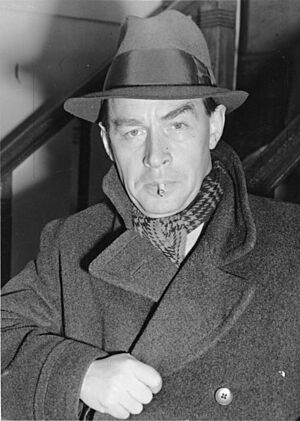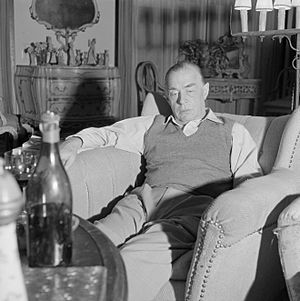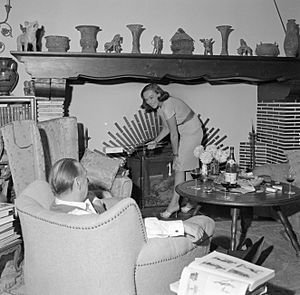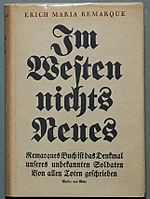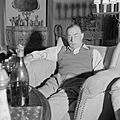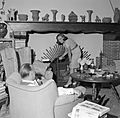Erich Maria Remarque facts for kids
Quick facts for kids
Erich Maria Remarque
|
|
|---|---|
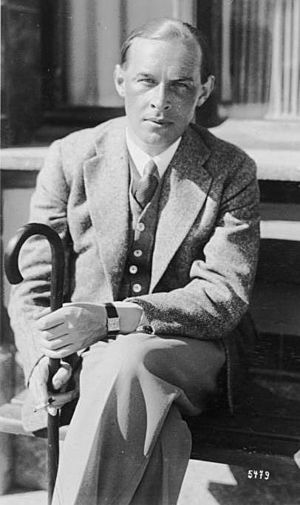
Remarque in 1929
|
|
| Born | Erich Paul Remark 22 June 1898 Osnabrück, Kingdom of Prussia, German Empire |
| Died | 25 September 1970 (aged 72) Locarno, Switzerland |
| Occupation | Novelist |
| Citizenship |
|
| Spouse |
Ilse Jutta Zambona
(m. 1925; div. 1930)Ilse Jutta Zambona
(m. 1938; div. 1957) |
Erich Maria Remarque (born Erich Paul Remark; 22 June 1898 – 25 September 1970) was a famous German writer. He is best known for his powerful novel All Quiet on the Western Front (1928). This book was based on his own experiences as a soldier during World War I. It became a huge international bestseller and helped create a new type of war story. The book has also been made into movies several times.
Remarque's stories often showed the terrible effects of war. Because of this, the Nazi government in Germany did not like his work. They called him "unpatriotic." However, Remarque used his success to move to Switzerland and then to the United States. He later became a citizen of the United States.
Contents
Early Life and Family
Erich Paul Remark was born on 22 June 1898, in Osnabrück, Germany. His family was working-class and Roman Catholic. His father, Peter Franz Remark, was a bookbinder. Erich was very close to his mother, Anna Maria. After World War I, he started using "Maria" as his middle name to honor her. He was the third of four children.
The spelling of his last name was originally "Remarque." His grandfather had changed it to "Remark" in the 1800s. When Erich published All Quiet on the Western Front, he changed it back to "Remarque." He did this to honor his French ancestors. It also helped him separate himself from an earlier novel he had written. Some research shows that his family came from a French background in Aachen. The Nazis later spread false rumors that his real name was "Kramer" (Remark spelled backward) and that he was Jewish. These claims were not true.
Military Service and New Jobs
When he was 18, Remarque was called to serve in the Imperial German Army during World War I. On 12 June 1917, he was sent to the Western Front. He fought in the trenches and was wounded by shell fragments on 31 July 1917. He was hurt in his left leg, right arm, and neck. After being treated, he recovered in a hospital in Germany. He was called back to duty in October 1918, but the war ended a month later.
After the war, Remarque finished his teacher training. He worked as a primary-school teacher for a short time. He then tried many different jobs. He worked as a librarian, a businessman, a journalist, and an editor. His first paid writing job was for a German tire company, where he wrote technical articles.
Writing Career and Famous Books
Remarque started writing when he was just 16 years old. He wrote essays, poems, and even the beginning of a novel. This novel was later finished and published in 1920 as The Dream Room. He also wrote comic series for a magazine.
The horrors of war and the death of his mother deeply affected him. As a professional writer, he used "Maria" as his middle name to remember his mother. He also changed his last name back to "Remarque" to distinguish his new, serious work from his earlier novel.
In 1927, he published Station at the Horizon. But his most important book, All Quiet on the Western Front, was written in 1927 and published in 1929. At first, he had trouble finding someone to publish it. The book described the harsh experiences of German soldiers in World War I. When it was finally published, it became a huge international success. It was a very important book in 20th-century literature. It inspired many other soldiers to write about their war experiences. It also led to plays and movies about the war in many countries.
After the success of All Quiet on the Western Front, Remarque wrote more books. These books described the war and the years after it in Germany. In 1931, he bought a villa in Switzerland with the money he earned from his books. He planned to live there and in France.
On 10 May 1933, the Nazi government in Germany banned Remarque's books. They said his writing was "unpatriotic." Copies of his books were removed from libraries and could not be sold. Germany was becoming a very strict country, and people who disagreed with the government were arrested. Remarque left Germany and moved to his villa in Switzerland. The Nazis attacked his French background and his Catholic faith. They also falsely claimed that he had not really fought in World War I. In 1938, Remarque lost his German citizenship.
In 1939, he and his ex-wife remarried to help her avoid being forced to return to Germany. Just before World War II started, they moved from Switzerland to the United States. They became citizens of the United States in 1947.
Remarque continued to write about the German experience after World War I. His novel Three Comrades tells a story from the years after the war. His book Arch of Triumph was published in 1945 and also became a huge bestseller. His last novel was Shadows in Paradise.
In 1943, the Nazis arrested Remarque's youngest sister, Elfriede Scholz. She had stayed in Germany. She was found guilty of "undermining morale" because she said she thought the war was lost. A judge told her, "Your brother is unfortunately beyond our reach—you, however, will not escape us." Elfriede was executed on 16 December 1943. Remarque did not know about his sister's death until after the war. He dedicated his 1952 novel Spark of Life to her.
Later Years and Legacy
In 1948, Remarque returned to Switzerland. He lived there for the rest of his life. After Arch of Triumph, he did not publish another book for seven years. His next book was Spark of Life, published in 1952. While writing it, he also worked on A Time to Love and a Time to Die, which came out in 1954. In 1958, this novel was made into a movie, and Remarque even had a small role in it.
Remarque also wrote screenplays and plays. His play Full Circle was performed in Germany and on Broadway. His last completed novel was The Night in Lisbon, published in 1962.
Personal Life
Remarque married actress Ilse Jutta Zambona in 1925. They divorced in 1930 but fled to Switzerland together in 1933. They remarried in 1938 to help her stay safe from the Nazis. In 1939, they moved to the United States and became citizens in 1947. They divorced for the final time in 1957.
In the 1930s, Remarque had relationships with other actresses, including Marlene Dietrich. He later married actress Paulette Goddard in 1958.
Death
Erich Maria Remarque passed away from heart failure at age 72 on 25 September 1970, in Locarno, Switzerland. He was buried in the Ronco Cemetery in Switzerland. His wife, Paulette Goddard, was buried next to him when she died in 1990. She left money to New York University to create an institute for European studies, named in honor of Remarque.
List of Works
Novels
- (1920) The Dream Room
- (written 1924, published 1998) Gam
- (1928) Station at the Horizon
- (1929) All Quiet on the Western Front
- (1931) The Road Back
- (1936) Three Comrades
- (1939) Flotsam
- (1945) Arch of Triumph
- (1952) Spark of Life
- (1954) A Time to Love and a Time to Die
- (1956) The Black Obelisk
- (1961) Heaven Has No Favorites
- (1962) The Night in Lisbon
- (1970) The Promised Land
- (1971) Shadows in Paradise
Other Works
- (1931) The Enemy (short stories)
- (1955) The Last Act (screenplay)
- (1956) Full Circle (play)
Images for kids
See also
 In Spanish: Erich Maria Remarque para niños
In Spanish: Erich Maria Remarque para niños
 | Chris Smalls |
 | Fred Hampton |
 | Ralph Abernathy |


